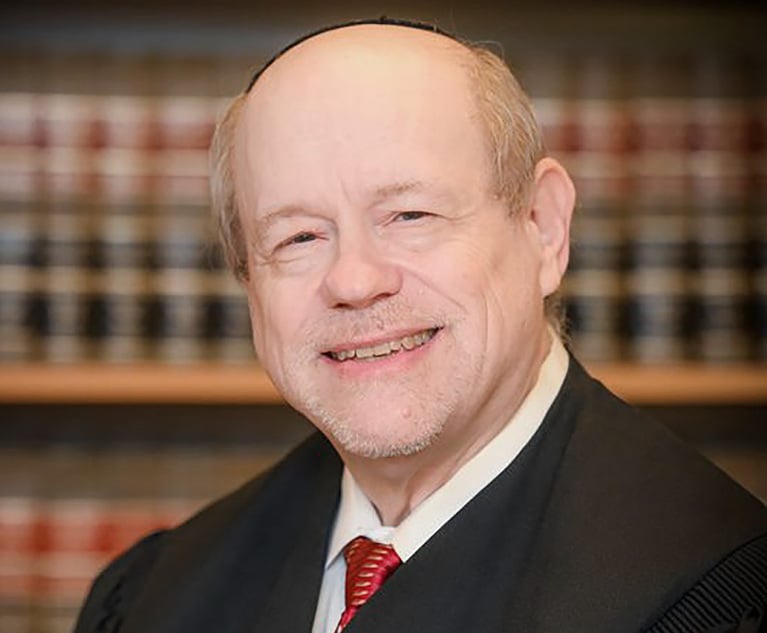Compassionate Release Under the First Step Act and Tenancy Destroyed by Fraud
In their Eastern District Roundup, Harvey M. Stone and Richard H. Dolan discuss several significant representative decisions handed down recently in the U.S. District Court for the Eastern District of New York. Judge Raymond J. Dearie found "extraordinary and compelling reasons" to grant compassionate release under the First Step Act, based on old and new events in a decades-old case. Judge Eric N. Vitaliano, assessing the defendant's medical condition and his criminal record, denied compassionate release under the First Step Act.
June 11, 2020 at 01:38 PM
10 minute read
 Harvey M. Stone and Richard H. Dolan
Harvey M. Stone and Richard H. Dolan
This column reports on several significant representative decisions handed down recently in the U.S. District Court for the Eastern District of New York. Judge Raymond J. Dearie found "extraordinary and compelling reasons" to grant compassionate release under the First Step Act, based on old and new events in a decades-old case. Judge Eric N. Vitaliano, assessing the defendant's medical condition and his criminal record, denied compassionate release under the First Step Act. And Judge Pamela K. Chen held that a tenancy by the entirety of a husband and wife, and the wife's right of survivorship, were destroyed by fraud.
- Compassionate Relief Granted Under The First Step Act
In a bracing 36-page opinion, Dearie granted compassionate relief under the First Step Act to Kevin Haynes, reducing his 46-year sentence for bank robbery to the 27 years already served. United States v. Haynes, 93 CR 1043 (EDNY, April 22, 2020).
In 1993 the government had offered Haynes a plea deal that would have resulted in a sentence of approximately eight years. It advised that, if he rejected the plea, additional firearms charges would be added under 18 U.S.C. Sectin 924(c). "Forty additional years in prison were imposed for the two charges the government brought in direct retaliation for Haynes' decision to go to trial."
Dearie needed to reach the merits of Haynes' application under the First Step Act only because the government refused to act on the court's repeated and forceful suggestions that, pursuant to Haynes' 2017 request, it make a motion to reduce sentence under United States v. Holloway, 68. F. Supp. 3d 310 (E.D.N.Y. 2014). The court made plain that it was "profoundly disappointed" in the government's refusal to make such a motion, which it described as "astounding." S
The First Step Act made two changes to the federal criminal code critical to Haynes' application. First, it amended 18 U.S.C. Section 924(c) to prohibit "stacking" of firearms offenses as had been done to Haynes. Second, it amended 18 U.S.C. Section 3582(c) to allow the district court to entertain a motion for compassionate relief by an incarcerated person, where previously such an application could be made only by the Bureau of Prisons (BOP).
Because the First Step Act's prohibition on "stacking" was not retroactive, Haynes could obtain relief only if he could show "extraordinary and compelling reasons" for reduction of sentence under 18 U.S.C. Section 3582(c)(1)(A)(i).
The court may reduce a sentence under 18 U.S.C. Section 3582(c)(1)(a)(i) only if "consistent with applicable policy statements issued by the Sentencing Commission." The Sentencing Commission had issued various statements prior to the First Step Act that referred to the BOP's "role as exclusive gatekeeper for such motions," including a statement that a "reduction under this policy statement may be granted only upon motion by the Director of the Bureau of Prisons." U.S. Sentencing Guidelines Manual Section 1B1.13 cmt. n.4. The government relied on that statement to argue that only the BOP, and not the court, had authority to determine whether compassionate relief was called for under 18 U.S.C. Section 3582(c).
Reviewing 14 district court decisions from around the country considering the question, Dearie sided with 13 that had allowed the court to determine whether "extraordinary and compelling reasons" for reduction of sentence are present. Statements of the Sentencing Commission that pre-dated the First Step Act should not be read to constrain a court's ability to award compassionate relief under 18 U.S.C. Section 3582(c). Statutory construction "is an 'holistic endeavor that must consider the entire statutory scheme,'" "the court's role is 'to make sense rather than nonsense out of the corpus juris,'" and "the latest enacted statute and its express purpose must be the keystone." Slip op. 25 (emphasis in original), quoting United States v. Cantu, 423 F. Supp. 3d 345, 350-51 (S.D. Tex. 2019) (internal citations omitted).
Because the First Step Act granted district courts the power to award compassionate relief under 18 U.S.C. Section 3582(c), Dearie had "the authority to grant the relief sought in this case … regardless of BOP's view on the matter and without having to await a someday-updating by the [Sentencing] Commission of its unquestionably outdated policy statement."
Having confirmed his authority to grant it, Dearie found Haynes entitled to compassionate relief. Haynes "has served more than three times the length of the high end of the sentence he would have received had he pleaded guilty … and still has an additional 13 years to serve." Relief was appropriate where the "additional 30 years in prison" was an "explicit" result of Haynes' exercising his Constitutional right in "electing to go to trial", slip op. 32, and the "stacking" that generated the additional time was expressly prohibited, prospectively, by the First Step Act's amendment to 18 U.S.C. Section 924(c). Haynes' older co-defendant—who, unlike Haynes, had a substantial prior criminal history—had received a 17-year sentence upon accepting the plea offered him, which was reduced to 10 years on appeal.
Haynes made an adequate showing of his ability to provide for himself after release. He had completed training for a Nurses' Aide Certificate, was training to become a paralegal, and could support himself financially in carpentry, construction work and trucking. Finally, Dearie determined that Haynes was not a danger to the community under 18 U.S.C. Section 3142(g). The 27 years Haynes had already served were sufficient to "reflect the seriousness of" and "provide just punishment for" his offense, and "to protect the public from further crimes of the defendant," as required by 18 U.S.C. Section 3533(a).
- Compassionate Release Denied
In United States v. Livingston, 18 CR 416 (EDNY, April 17, 2020), Vitaliano, denying compassionate release under the First Step Act, 18 U.S.C. Sectuib 3582(c), explained the basis for an earlier ruling that the exhaustion requirement should be waived, but release was not justified.
In ordinary times the statutorily imposed exhaustion requirement—an application to the Bureau of Prisons (BOP), which has 30 days to take action—is not waivable. Now, during a life-threatening pandemic, the "judge-made exception" to this prescription is "compelled by the higher authority and God-made injunction to act … to save human life."
In January 2020 defendant, a 32-year-old man, was sentenced for being a felon in possession of a firearm. He has been incarcerated at the Metropolitan Detention Center (MDC) in Brooklyn. Prison doctors diagnosed him with pre-diabetes, resulting in his designation on a BOP list of MDC inmates "vulnerable" to the COVID-19 virus. These factors are enough to justify waiving the exhaustion requirement and reaching the merits of the application. But he could not show "extraordinary and compelling reasons," as required by the act, to warrant release.
Nothing in the CDC's guidelines suggests that pre-diabetes, as opposed to diabetes itself, creates a higher risk of severe illness in the event of a COVID-19 infection. The defendant's vulnerability to the virus would be "only slightly more concerning than that of the average detainee."
Turning to the factors weighing against release, Vitaliano pointed to the defendant's extensive criminal record, including possession of firearms, and his disrespect for instructions to refrain from criminal behavior while on bond. For example, he tested positive for narcotics within a day of his release on bond in this case and soon thereafter ran crack sales out of his residence, leading to his arrest by local police. As framed by his application papers, if released here, he "planned to head right back to the crack house where police had arrested him." This track record suggests a likely reversion to the familiar patterns of conduct. Vitaliano also expressed concern about the risk to probation officers of exposure to the virus in supervising such an offender.
- Tenancy by the Entirety and Fraud
In Allstate Insurance v. Mirvis, 08 CV 4405 (EDNY, Apr. 24, 2020), Chen, adopting the Report and Recommendation (R&R) of Magistrate Judge Peggy Kuo, terminated the tenancy by the entirety of defendant Mark Mirvis and his wife, along with the wife's right of survivorship, in certain real property. In May 2015, a default judgment in the amount of $45,657,401.01 was entered against Mirvis and his co-defendants based on their involvement in an extensive criminal organization that engaged in massive automobile insurance fraud. The plaintiffs sought an order directing the U.S. Marshals to sell the real property in Hewlett Harbor, New York, owned by Mirvis and his wife as tenants by the entirety. The court referred the judgment enforcement action to Kuo, who issued the R&R recommending that the court grant the motion to enforce the judgment.
Six days after the May 2015 default judgment had been entered, Mirvis and his wife Lyubov Mirvis executed a deed conveying their entire interest in the real property to their daughter, Tatyana Mirvis. In September 2017, District Judge Sandra L. Towns, adopting an earlier R&R by Kuo, voided the conveyance to Tatyana and ordered the U.S. Marshals to levy on the property. Plaintiffs filed their motion for enforcement in June 2019, arguing that the tenancy by the entirety was destroyed by fraud when Mirvis and his wife tried to convey the property to Tatyana in May 2015. Nonparties Lyubov and Tatyana filed an "interested party" opposition to the motion.
A tenancy by the entirety does not shield the interest of the debtor, but a purchaser of the property becomes a tenant in common with the debtor's spouse and is subject to the spouse's survivorship rights. Once a tenancy by the entirety is destroyed, as here with the fraudulent conveyance of the property, the entire value of the property is subject to execution by a creditor. Lyubov objected to the portions of the R&R that pertained to her interest, arguing that stripping her of her right of survivorship was too harsh a penalty.
Relying on Clarkson Company Limited v Shaheen, 533 F. Supp. 905, 924 (S.D.N.Y 1982), Chen agreed with Kuo's conclusion that, given Lyubov's participation in the fraud, "'equity permits her to be stripped of her right of survivorship as against the creditor [of her debtor-husband] she tried to defraud.'" Chen noted that there was no New York Court of Appeals decision requiring that Lyubov's right of survivorship be upheld. Lyubov's behavior was particularly egregious because she had participated in repeated acts over several years "undertaken as part of a persistent and pernicious campaign by Mirvis and his family to avoid paying any part of the $45-million judgment entered against Mivis arising out of a massive health care fraud scheme." As Chen concluded, "this remedy [of vacating her right of survivorship] is not 'punitive,' but is instead proportional to Lyubov's conduct and necessary to achieve the full measure of recovery to which plaintiffs are entitled."
Harvey M. Stone and Richard H. Dolan are partners at Schlam Stone & Dolan. Bennette D. Kramer, a partner of the firm, assisted in the preparation of the article.
This content has been archived. It is available through our partners, LexisNexis® and Bloomberg Law.
To view this content, please continue to their sites.
Not a Lexis Subscriber?
Subscribe Now
Not a Bloomberg Law Subscriber?
Subscribe Now
NOT FOR REPRINT
© 2025 ALM Global, LLC, All Rights Reserved. Request academic re-use from www.copyright.com. All other uses, submit a request to [email protected]. For more information visit Asset & Logo Licensing.
You Might Like
View All
Decision of the Day: Qui Tam Relators Do Not Plausibly Claim Firm Avoided Tax Obligations Through Visa Applications, Circuit Finds

'Serious Legal Errors'?: Rival League May Appeal Following Dismissal of Soccer Antitrust Case
6 minute read
Decision of the Day: Judge Sanctions Attorney for 'Frivolously' Claiming All Nine Personal Injury Categories in Motor Vehicle Case

Law Firms Mentioned
Trending Stories
- 1Rejuvenation of a Sharp Employer Non-Compete Tool: Delaware Supreme Court Reinvigorates the Employee Choice Doctrine
- 2Mastering Litigation in New York’s Commercial Division Part V, Leave It to the Experts: Expert Discovery in the New York Commercial Division
- 3GOP-Led SEC Tightens Control Over Enforcement Investigations, Lawyers Say
- 4Transgender Care Fight Targets More Adults as Georgia, Other States Weigh Laws
- 5Roundup Special Master's Report Recommends Lead Counsel Get $0 in Common Benefit Fees
Who Got The Work
J. Brugh Lower of Gibbons has entered an appearance for industrial equipment supplier Devco Corporation in a pending trademark infringement lawsuit. The suit, accusing the defendant of selling knock-off Graco products, was filed Dec. 18 in New Jersey District Court by Rivkin Radler on behalf of Graco Inc. and Graco Minnesota. The case, assigned to U.S. District Judge Zahid N. Quraishi, is 3:24-cv-11294, Graco Inc. et al v. Devco Corporation.
Who Got The Work
Rebecca Maller-Stein and Kent A. Yalowitz of Arnold & Porter Kaye Scholer have entered their appearances for Hanaco Venture Capital and its executives, Lior Prosor and David Frankel, in a pending securities lawsuit. The action, filed on Dec. 24 in New York Southern District Court by Zell, Aron & Co. on behalf of Goldeneye Advisors, accuses the defendants of negligently and fraudulently managing the plaintiff's $1 million investment. The case, assigned to U.S. District Judge Vernon S. Broderick, is 1:24-cv-09918, Goldeneye Advisors, LLC v. Hanaco Venture Capital, Ltd. et al.
Who Got The Work
Attorneys from A&O Shearman has stepped in as defense counsel for Toronto-Dominion Bank and other defendants in a pending securities class action. The suit, filed Dec. 11 in New York Southern District Court by Bleichmar Fonti & Auld, accuses the defendants of concealing the bank's 'pervasive' deficiencies in regards to its compliance with the Bank Secrecy Act and the quality of its anti-money laundering controls. The case, assigned to U.S. District Judge Arun Subramanian, is 1:24-cv-09445, Gonzalez v. The Toronto-Dominion Bank et al.
Who Got The Work
Crown Castle International, a Pennsylvania company providing shared communications infrastructure, has turned to Luke D. Wolf of Gordon Rees Scully Mansukhani to fend off a pending breach-of-contract lawsuit. The court action, filed Nov. 25 in Michigan Eastern District Court by Hooper Hathaway PC on behalf of The Town Residences LLC, accuses Crown Castle of failing to transfer approximately $30,000 in utility payments from T-Mobile in breach of a roof-top lease and assignment agreement. The case, assigned to U.S. District Judge Susan K. Declercq, is 2:24-cv-13131, The Town Residences LLC v. T-Mobile US, Inc. et al.
Who Got The Work
Wilfred P. Coronato and Daniel M. Schwartz of McCarter & English have stepped in as defense counsel to Electrolux Home Products Inc. in a pending product liability lawsuit. The court action, filed Nov. 26 in New York Eastern District Court by Poulos Lopiccolo PC and Nagel Rice LLP on behalf of David Stern, alleges that the defendant's refrigerators’ drawers and shelving repeatedly break and fall apart within months after purchase. The case, assigned to U.S. District Judge Joan M. Azrack, is 2:24-cv-08204, Stern v. Electrolux Home Products, Inc.
Featured Firms
Law Offices of Gary Martin Hays & Associates, P.C.
(470) 294-1674
Law Offices of Mark E. Salomone
(857) 444-6468
Smith & Hassler
(713) 739-1250






